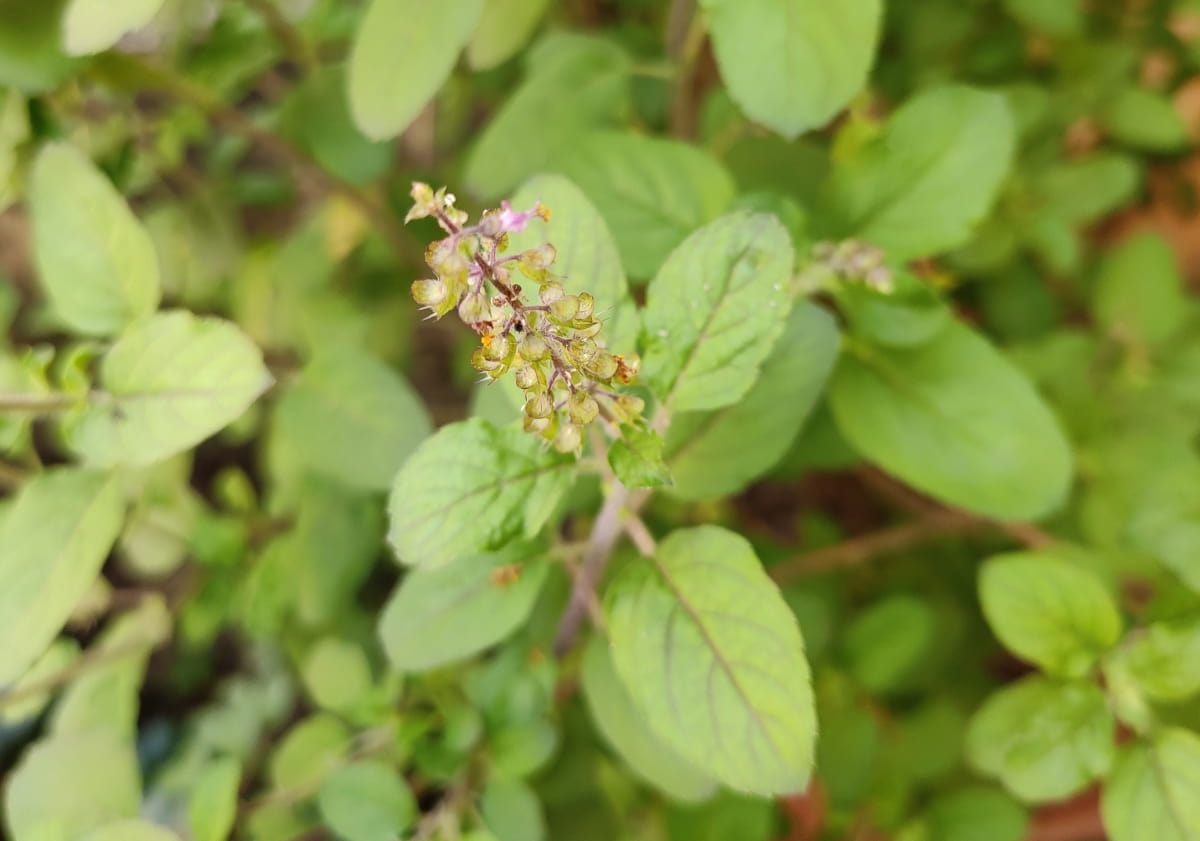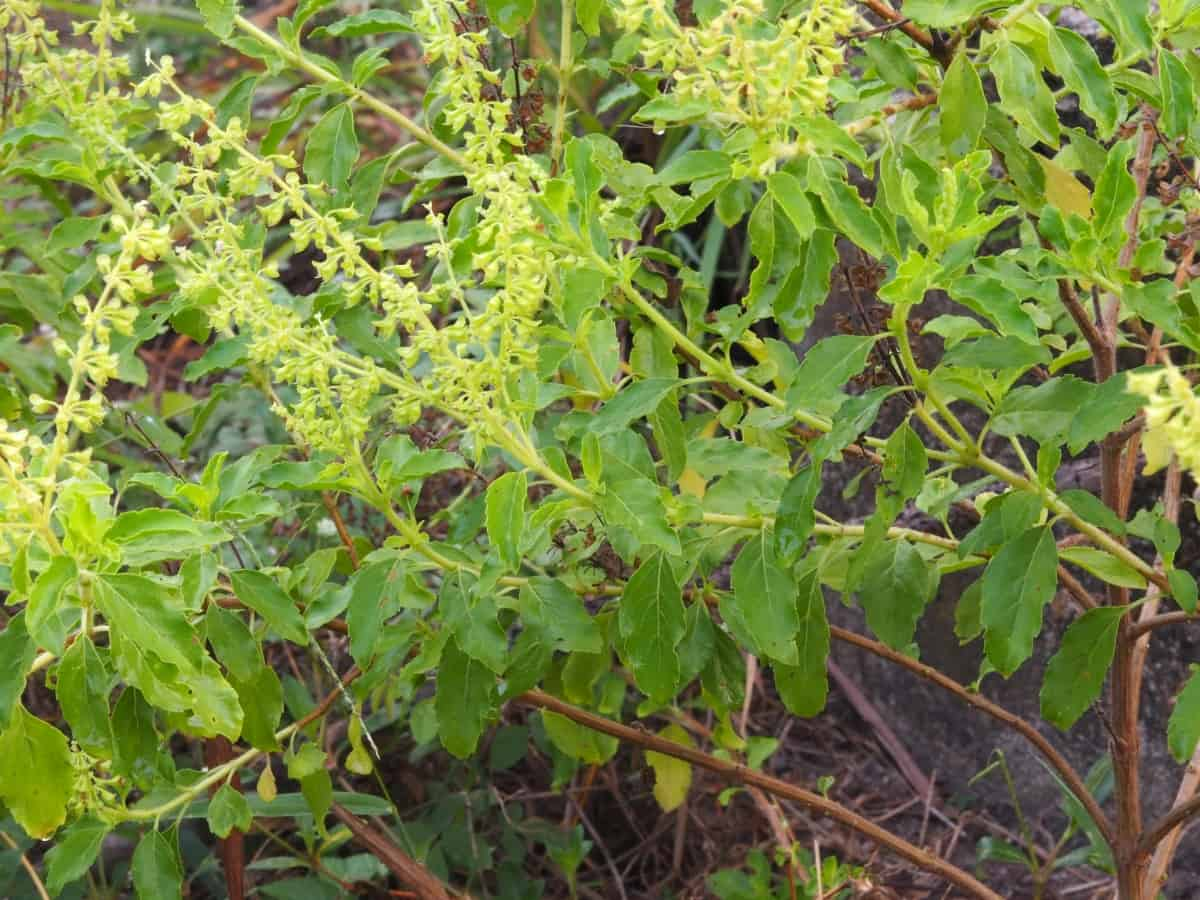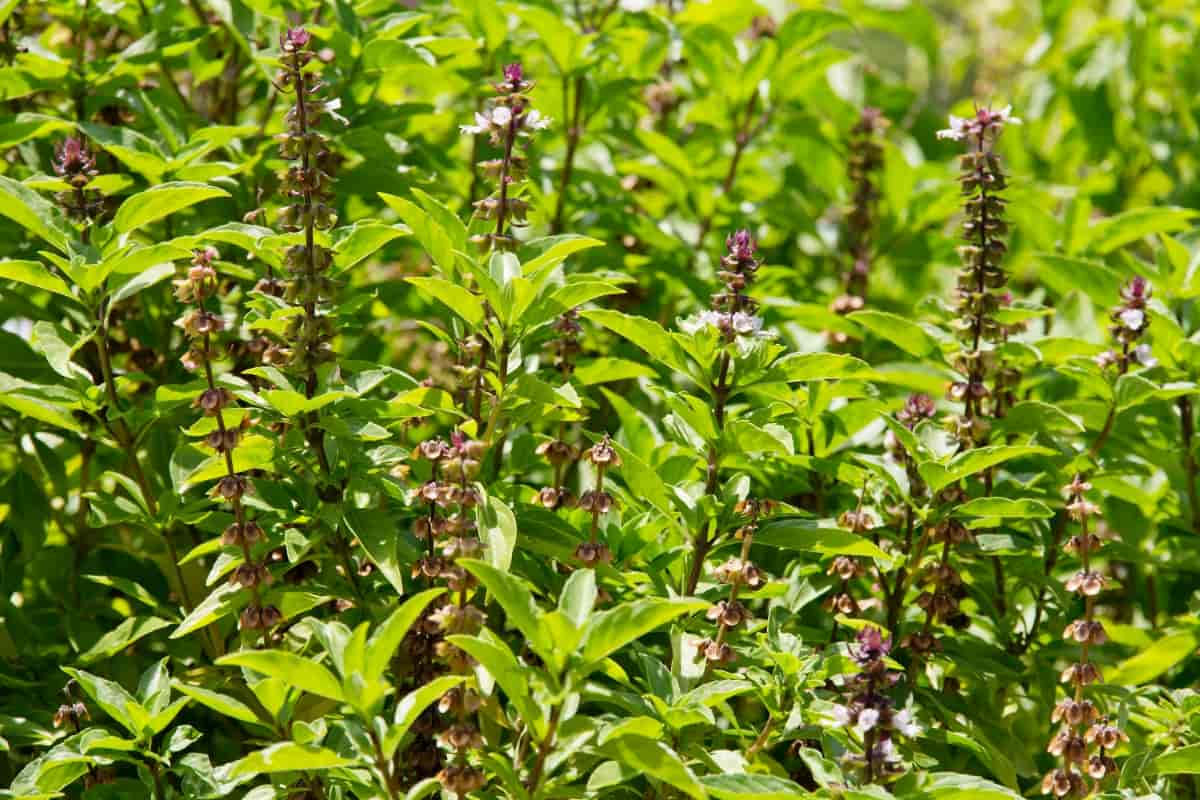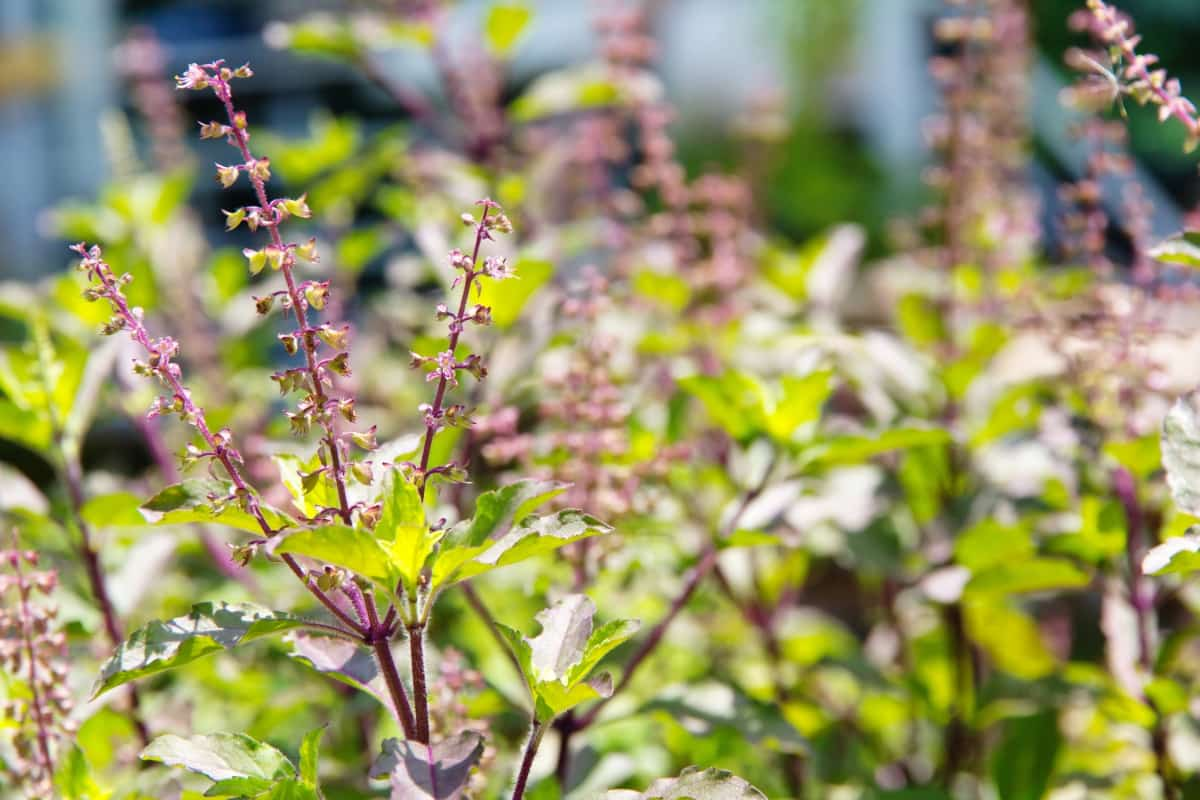Tulsi, also known as Holy Basil, is a sacred plant in many cultures and a valuable addition to home gardens due to its numerous health benefits. However, the Tulsi plant’s lush greenery and aromatic leaves can attract unwanted pests that may compromise its growth. To maintain your Tulsi plants’ well-being without using chemical pesticides, homemade organic pest control solutions provide a safe and eco-friendly alternative. This guide will explore various natural remedies and recipes tailored specifically for Tulsi plants, offering you a holistic and cost-effective approach to pest control.

Homemade Organic Pest Control for Tulsi Plants
Neem Oil Helps Protect Tulsi Plants from Pests
Neem oil is an effective and safe natural remedy for safeguarding your Tulsi plants from pests. Extracted from the neem tree’s seeds, this oil is an effective insect repellent and fungicide. To create a simple neem oil spray, mix neem oil ( one teaspoon) with a few drops of mild dish soap in a liter of water.
Shake the mixture well and spray it on your Tulsi plants, paying attention to the undersides of leaves where pests often hide. Neem oil disrupts the life cycle of pests, inhibiting their ability to feed and reproduce. Regular application, especially during the growing season, can help maintain a pest-free environment for your Tulsi.
Garlic Spray Keeps Away Aphids and Whiteflies
A garlic spray is a natural and potent solution to keep aphids and whiteflies at bay, safeguarding the health of your Tulsi plants. C crush several garlic cloves and let them steep in water overnight to prepare the spray. Strain the mixture and mix a few drops of dish soap into it.
Dilute this mixture with water and spray it on your Tulsi plants. The strong odor of garlic is a deterrent, warding off aphids and whiteflies. Regular application, especially in the early morning or late evening, when these pests are most active, can provide ongoing protection. This organic garlic spray effectively controls pests and promotes a healthier and thriving Tulsi garden without harmful chemicals.
Cayenne Pepper Stops Caterpillars and Beetles
Harness the power of cayenne pepper to deter caterpillars and beetles from feasting on your Tulsi plants. Create a simple cayenne pepper spray by mixing a teaspoon of cayenne pepper with a quart of water and a few drops of dish soap. Shake well and spray the mixture on your Tulsi plants, concentrating on areas where caterpillars and beetles are most likely to appear. The spicy nature of cayenne pepper acts as a natural repellent, discouraging these pests from damaging your beloved Tulsi. Regular application, especially after rainfall or as a preventive measure during the growing season, can effectively protect your plants.
Soap Solution Fights Mealybugs and Spider Mites
Combat mealybugs and spider mites with a gentle soap solution that won’t harm your Tulsi plants. Mix a few drops of liquid soap, preferably insecticidal soap, with water. Spray the solution on the affected areas of your Tulsi, covering both the upper and lower leaf surfaces. The soap disrupts the protective coating of these pests, leading to dehydration and eventual elimination. Regular use of this soap solution, particularly on the undersides of leaves, helps control mealybug and spider mite infestations, promoting the overall health of your Tulsi plants in an organic and eco-friendly way.
In case you missed it: 12 Causes of a Dying Tulsi Plant and How to Fix It?

Horticultural Oil Defends Against Scales and Mites
Shield your Tulsi plants from scales and mites with horticultural oil, a safe and effective solution. Horticultural oils, derived from mineral or vegetable sources, suffocate and disrupt the life cycles of these pests. Dilute the oil according to package instructions and spray it evenly on your Tulsi, targeting the areas where scales and mites are present. This natural defense mechanism helps keep your plants healthy without harming beneficial insects.
Diatomaceous Earth Works Against Slugs and Snails
Combat slugs and snails organically by using diatomaceous earth (DE). DE is a fine powder containing fossilized diatoms that have sharp edges, effectively dehydrating and deterring these pests. Sprinkle a layer of DE around the base of your Tulsi plants to create a barrier. When slugs and snails come into contact with the powder, it absorbs their moisture, causing them to dry out and perish. Reapply after rain and keep the area dry for optimal effectiveness. This eco-friendly method safeguards your Tulsi without resorting to harmful chemicals, promoting a thriving and pest-free garden.
Neem Seed Extract Prevents Fungal Infections
Guard your Tulsi plants against fungal infections with neem seed extract, a natural and powerful solution. Neem contains compounds that possess antifungal properties, disrupting the growth and development of fungi. Mix neem seed extract with water according to package instructions to create a preventative spray.
In case you missed it: Neem Oil for Lawn Care: How to Use as Organic Pest Control Solution for Lawn Grass

Apply the solution to your Tulsi plants, ensuring thorough upper and lower leaf surface coverage. Neem combats existing fungal issues and acts as a preventive measure, fortifying your Tulsi against potential infections. Regular application, especially during periods of high humidity, helps maintain a healthy and disease-resistant garden.
Baking Soda Tackles Ants and Aphids
Say goodbye to ants and aphids with a natural and cost-effective solution – baking soda. Create a simple spray by combining one tablespoon of baking soda and a few drops of liquid soap in a liter of water. Thoroughly mix the ingredients and spray the solution onto your Tulsi plants, focusing on areas with ant activity and aphid clusters.
Baking soda disrupts the protective coatings of these pests, causing them to dehydrate and perish. Regular application, especially during the growing season or when pests are most active, provides an eco-friendly way to control ant and aphid populations while preserving the health of your Tulsi plants. This method is safe for the environment and won’t harm beneficial insects.
Garlic Tea Serves as a Pesticide for Nematodes
Protect your Tulsi plants from nematodes with the power of garlic tea, a natural and potent pesticide. To make garlic tea, finely chop several garlic cloves and boil and steep them in hot water for about 24 hours. Strain the liquid and dilute it with water before applying it to the soil around your Tulsi plants.
The strong scent of garlic is a deterrent, warding off nematodes and protecting the roots of your plants. Regular application, especially before planting or during the growing season, helps control nematode populations organically, promoting the well-being of your Tulsi garden without the need for harmful chemicals.
Citrus Peel Wards Off Caterpillars and Beetles
Harness the natural power of citrus peels to deter caterpillars and beetles from your Tulsi plants. Collect citrus peels from oranges, lemons, or grapefruits and scatter them around the base of your Tulsi. The strong citrus scent acts as a natural repellent, discouraging caterpillars and beetles from approaching.
In case you missed it: How to Use Neem Oil in Greenhouse Gardening: Organic Pest Control Method for Greenhouse Crops

Regularly replace the peels to maintain their effectiveness. This eco-friendly method safeguards your Tulsi from pests and adds a pleasant citrus aroma to the garden. Embrace the protective properties of citrus peels for a chemical-free and aromatic solution to keep caterpillars and beetles at bay.
Conclusion
In conclusion, adopting homemade organic pest control for Tulsi plants provides a sustainable and environmentally friendly approach to safeguarding your garden. By embracing these natural solutions, you protect your Tulsi plants from harm and contribute to a healthier ecosystem, fostering a thriving and pesticide-free garden.
- Feed Your Flock for Less: Top 10 Tips to Save on Chicken Feed
- Ultimate Guide to Ossabaw Island Hog: Breeding, Raising, Diet, and Care
- Hatching Answers: The Top 10 Reasons Your Chickens Aren’t Laying Eggs
- Eggs and Economics: Breaking Down the Cost of Raising Backyard Chickens
- Defend Your Greens: Proven Methods to Keep Iguanas Out of Your Garden
- Ultimate Guide to Cinnamon Queen Chicken: A Comprehensive Guide for Beginners
- Ultimate Guide to California Tan Chicken: Breeding, Raising, Diet, Egg-Production and Care
- Ultimate Guide to Marsh Daisy Chicken: Breeding, Raising, Diet, and Care
- 10 Types of Chicken Farming Businesses You Can Start for Profits